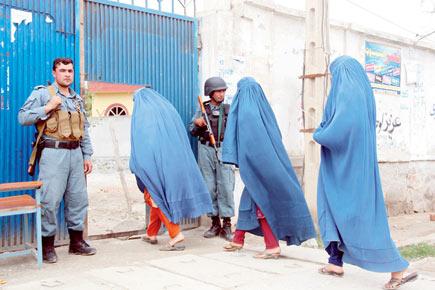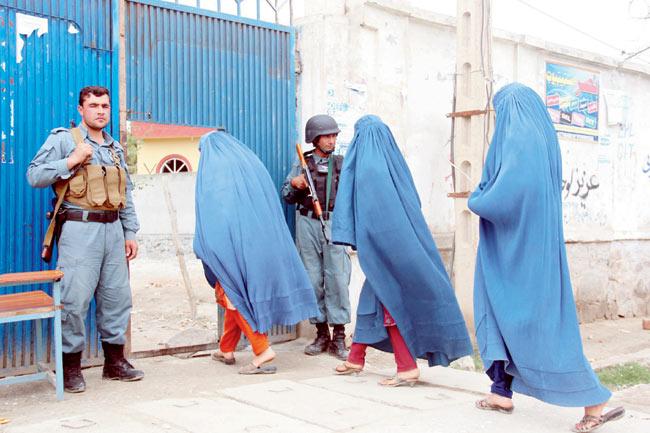Whoever coined the phrase “the dance of democracy” captured the essence of the electoral process that celebrates democracy. Barely three months after the elections in Bangladesh — and battling against worse odds — Afghanistan went to polls on Saturday


Whoever coined the phrase “the dance of democracy” captured the essence of the electoral process that celebrates democracy. Barely three months after the elections in Bangladesh — and battling against worse odds — Afghanistan went to polls on Saturday.
ADVERTISEMENT
People came out in large numbers to vote in the war-torn country’s first ever transfer of power through the ballot box.

Fearless: Afghan women voters turned up early on Saturday to cast their votes in traditional attire, which also helped in hiding their identities from the Taliban. pic/EPA
About 400,000 of Afghanistan’s police and soldiers were on duty to ensure that 12 million registered voters could exercise their franchise without fear of intimidation. Media reports say the Afghan government had employed “200,000 observers to ensure fair election, 3,000 donkeys to carry ballots from 6,775 polling stations to cities to be counted.” Violence had marred the 2009 presidential election, and there were fears that the Taliban might succeed in terrorising voters this time too.
A series of attacks by the Taliban leading up to the vote could not deter millions of Afghans wanting to secure their country’s future as a democracy moving towards peace and progress. Afghans have fought a long war and paid a heavy price to keep the Taliban at bay since 2001.
Women voters turned up early morning on Saturday to cast their votes in traditional attire, which also helped in hiding their identity from the Taliban. There are 300 women running for office in Afghanistan, a testimony to the fact that the country is surely winning the war against Talibanisation of society and polity, as compared to its eastern neighbour Pakistan. This is yet another example of how Afghanistan is closer to India than to Pakistan, in the way it wants to fashion its future as a nation.
This is the third election in Afghanistan since the Taliban was thrown out in 2001 with Hamid Karzai having served as acting president from 2001 to 2004, and then a second term in 2009. The contenders for the top posts who have projected themselves as nationalists — and not warlords — are former Foreign Ministers Abdullah Abdullah and Zalmai Rassoul and former Finance Minister Ashraf Ghani. If no candidate wins more than 50 per cent of the vote, the two top contenders will go to a run-off on May 28. Campaigning has been minus the rancour and petty infighting that was visible in the earlier elections. Nader Nadery, an election observer says, “Those who were fighting each other are now trying to put guns aside and sit together in parliament. They understand that if there is no election, the old ways of brutality and violence will come back.”
And at the campaign rallies, this is exactly what the candidates were focusing on: promising an Afghanistan free of war and violence and a country focused on development and jobs creation. They were targeting the youth as two-thirds of Afghans are under the age of 25; they were going to brave the threats and vote in large numbers. The youth want to be the agents of change in Afghanistan.
This is a generation of Afghans which will resist Pakistan’s attempt to make the country its backyard. These are the Afghans who are ready to take back the country from America after 11 years. This is a generation that wants to refashion its identity, not as a perpetual war-ravaged zone but as a democratic country moving towards peace and prosperity.
Quite naturally, the youth look towards India for support and cooperation. But India’s complex and problematic relationship with Pakistan impedes a robust relationship with Afghanistan. Pakistan’s paranoia about India’s increasing influence in Afghanistan has led it to fashion a policy of “Strategic Depth” over Afghan politics and militant groups.
Pakistan disbelieves the idea that India could play any constructive role in Afghanistan. India’s $2 billion aid package includes several big projects like building power lines from Uzbekistan to Kabul, roads, schools, clinics, government buildings and so on. And all this comes with no strings attached. On the other hand when Pakistan offered $20 million to help the Afghan army last November, President Karzai did not even acknowledge it. Pakistani commentators were quick to dub this as a snub done under Indian pressure. Pakistan created and has encouraged the Taliban, initially via covert engagement and then with blatant open support.
And it has had to pay the price for feeding the monster. The Taliban calls the shots in Pakistan now, while a new non-Talibanised era dawns in Afghanistan. There are huge challenges ahead as the US drawdown comes into effect, but with this election, the people have shown that their future will be an Afghan-led and Afghan-owned one.
Smita Prakash is Editor, News at Asian News International. You can follow her on twitter @smitaprakash
 Subscribe today by clicking the link and stay updated with the latest news!" Click here!
Subscribe today by clicking the link and stay updated with the latest news!" Click here!







